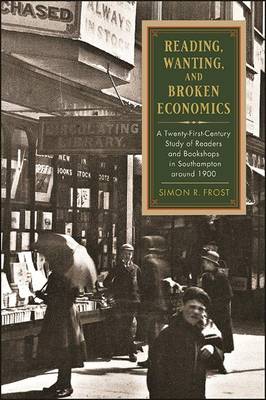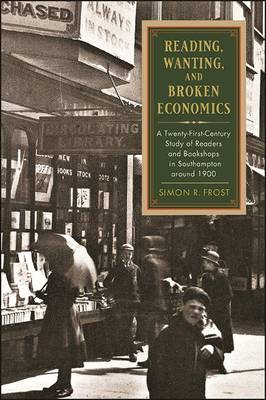
- Afhalen na 1 uur in een winkel met voorraad
- Gratis thuislevering in België vanaf € 30
- Ruim aanbod met 7 miljoen producten
- Afhalen na 1 uur in een winkel met voorraad
- Gratis thuislevering in België vanaf € 30
- Ruim aanbod met 7 miljoen producten
Reading, Wanting, and Broken Economics
A Twenty-First-Century Study of Readers and Bookshops in Southampton around 1900
Simon R FrostOmschrijving
Uses a historical study of bookselling and readers as a way to question and rethink our understanding of the market for symbolic goods.
Combining historical study, theorization, and experimental fiction, this book takes commodity culture and book retail around 1900 as the prime example of a market of symbolic goods. With the port of Southampton, England, as his case study, Simon R. Frost reveals how the city's bookshops, with their combinations of libraries, haberdashery, stationery, and books, sustained and were sustained by the dreams of ordinary readers, and how together they created the values powering this market. The goods in this market were symbolic and were not "consumed" but read. Their readings were created between other readers and texts, in happy disobedience to the neoliberal laws of the free market. Today such reader-created social markets comprise much of the world's branded economies, which is why Frost calls for a new understanding of both literary and market values.
Specificaties
Betrokkenen
- Auteur(s):
- Uitgeverij:
Inhoud
- Aantal bladzijden:
- 396
- Taal:
- Engels
- Reeks:
Eigenschappen
- Productcode (EAN):
- 9781438483511
- Verschijningsdatum:
- 1/05/2021
- Uitvoering:
- Hardcover
- Formaat:
- Genaaid
- Afmetingen:
- 152 mm x 229 mm
- Gewicht:
- 752 g

Alleen bij Standaard Boekhandel
Beoordelingen
We publiceren alleen reviews die voldoen aan de voorwaarden voor reviews. Bekijk onze voorwaarden voor reviews.











